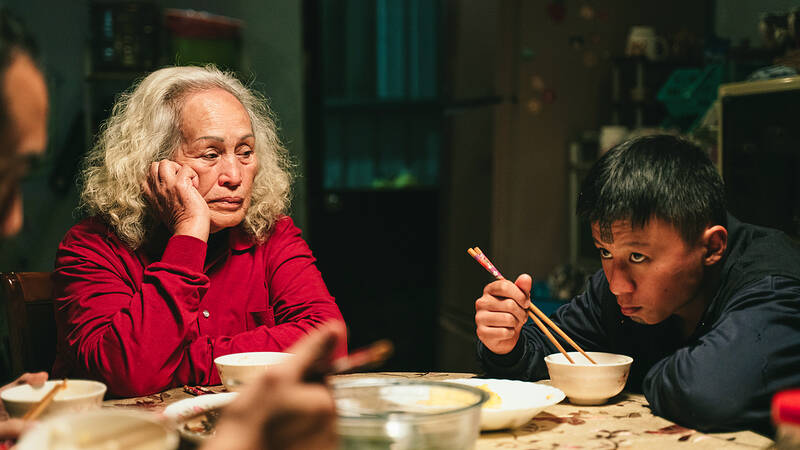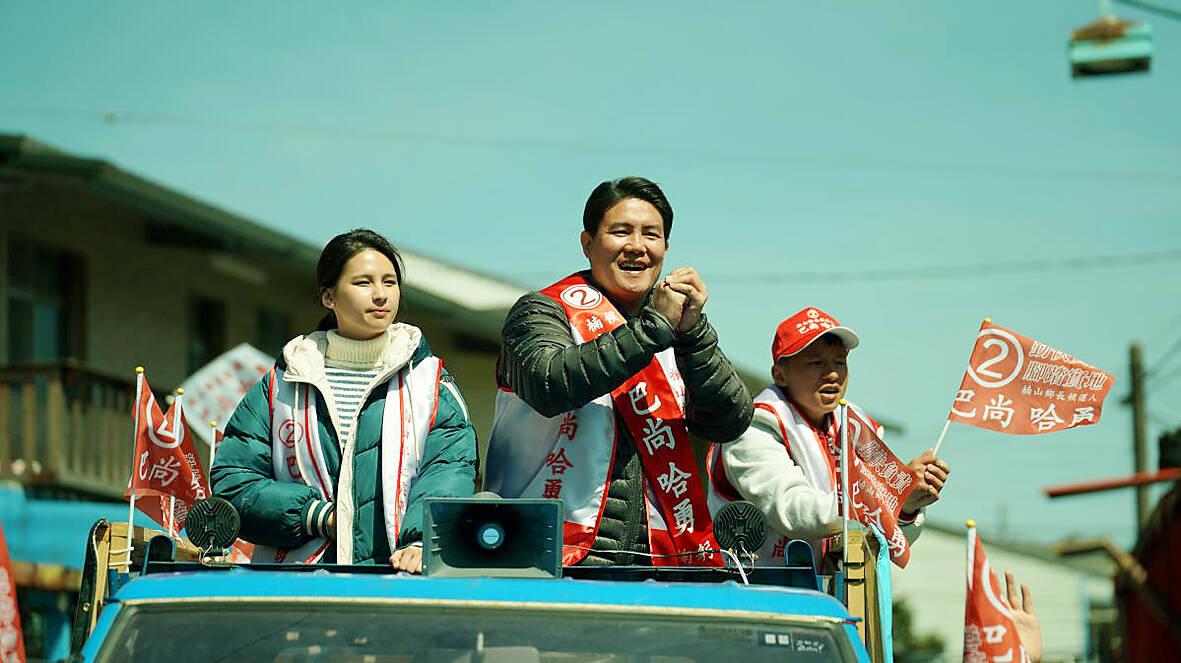Despite the stunning mountainscapes that turn white in the winter, life in the remote indigenous Atayal village of Pyanan (南山) is far from idyllic — especially for Hayung’s family.
Employing mostly amateur actors, this candid drama by Atayal director Laha Mebow follows the daily lives of a three-generational household, who among other issues, are dealing with the loss of family land to their neighbors, an unplanned pregnancy and the death of the eponymous patriarch.
The well-respected Hayung laments aloud after the verdict comes down on the land: “Is there no more gaga in this village?” It’s true that gaga, a traditional system of morals and conduct, is fading along with the community’s language and culture. Instead, his eldest son Pasang (Wilang Lalin) runs for township chief to save the land, investing what’s left of the family’s limited resources to fund the campaign.

Photo courtesy of Sky Films Entertainment
The conflict between indigenous traditions and modern, mainstream society is a central theme in the movie, but the emotional, human drama that ensues as the family struggles to deal with their circumstances is what drives the plot. The cultural differences are obvious but not overstated or exoticized, it’s just part of this particular backdrop for a scenario that could happen in any Taiwanese village.
There’s no need to preach. In fact, gaga isn’t even defined in the film. But viewers will definitely understand through the dialogue and events the essence of what it represents to the Atayal.
The cultural contrasts manifest differently in each character, starting from the stern but loving grandmother (Kagaw Piling) who is rooted in the old ways yet unconditionally supports her sons’ decisions. Retired soldier Pasang works as a cultural tour guide for the village, and despite the family’s finances his 20-year-old daughter Ali is still able to go for an extended working holiday in New Zealand.

Photo courtesy of Sky Films Entertainment
Although there’s still much Atayal spoken in the household, use of it clearly decreases by generation, with younger members of the community mostly speaking Mandarin and focusing on practicing English. Ali’s boyfriend Andy (Andy Huang, 黃信赫), who makes a surprise visit from New Zealand, appears to be Han-Taiwanese (it’s never clearly stated) but doesn’t speak a lick of Mandarin, contrasting with the indigenous cultural loss. On the other hand, Enoch (Yukan Losing), Pasang’s nephew, is eager to learn the traditional ways from his elders, such as hunting, slaughtering pigs and playing the mouth-harp.
Enoch’s carefree and curious character pushes the plot forward — he’s not exactly involved in the drama, but his role is definitely memorable as he tries to understand where he belongs in a fast-changing world. Yukan Losing’s performance earned him a Golden Horse nomination for best newcomer, one of six awards the movie will be vying for at tomorrow’s award ceremony.
Wilang Lalin also deserves mention for his deft portrayal of the tragic hero Pasang, who tries to do the best he can for his loved ones despite the chaos and strife that ensues.
Life is not the easiest in Pyanan, but the subtle, self-deprecating humor and strong dynamic of a family that deeply cares for each other despite their differences, keeps the mood light-hearted.
It’s not an overt statement on indigenous rights or cultural preservation, nor is there any big revelation or overcoming-all-odds tale here; it’s just an honest, compelling look at the ups and downs of life in a tight-knit community.
Stereotypes toward indigenous people, such as poverty and alcoholism, are apparent, but Laha Mebow has said in an interview that these are real problems that many communities face. They’re shown matter-of-factly and represent just one small part of their daily lives, adding to the deeper exploration of the complexities of a long-marginalized people still grappling with their place in a society dominated by Han-Taiwanese.

The Taipei Times last week reported that the rising share of seniors in the population is reshaping the nation’s housing markets. According to data from the Ministry of the Interior, about 850,000 residences were occupied by elderly people in the first quarter, including 655,000 that housed only one resident. H&B Realty chief researcher Jessica Hsu (徐佳馨), quoted in the article, said that there is rising demand for elderly-friendly housing, including units with elevators, barrier-free layouts and proximity to healthcare services. Hsu and others cited in the article highlighted the changing family residential dynamics, as children no longer live with parents,

It is jarring how differently Taiwan’s politics is portrayed in the international press compared to the local Chinese-language press. Viewed from abroad, Taiwan is seen as a geopolitical hotspot, or “The Most Dangerous Place on Earth,” as the Economist once blazoned across their cover. Meanwhile, tasked with facing down those existential threats, Taiwan’s leaders are dying their hair pink. These include former president Tsai Ing-wen (蔡英文), Vice President Hsiao Bi-khim (蕭美琴) and Kaohsiung Mayor Chen Chi-mai (陳其邁), among others. They are demonstrating what big fans they are of South Korean K-pop sensations Blackpink ahead of their concerts this weekend in Kaohsiung.

Taiwan is one of the world’s greatest per-capita consumers of seafood. Whereas the average human is thought to eat around 20kg of seafood per year, each Taiwanese gets through 27kg to 35kg of ocean delicacies annually, depending on which source you find most credible. Given the ubiquity of dishes like oyster omelet (蚵仔煎) and milkfish soup (虱目魚湯), the higher estimate may well be correct. By global standards, let alone local consumption patterns, I’m not much of a seafood fan. It’s not just a matter of taste, although that’s part of it. What I’ve read about the environmental impact of the

Oct 20 to Oct 26 After a day of fighting, the Japanese Army’s Second Division was resting when a curious delegation of two Scotsmen and 19 Taiwanese approached their camp. It was Oct. 20, 1895, and the troops had reached Taiye Village (太爺庄) in today’s Hunei District (湖內), Kaohsiung, just 10km away from their final target of Tainan. Led by Presbyterian missionaries Thomas Barclay and Duncan Ferguson, the group informed the Japanese that resistance leader Liu Yung-fu (劉永福) had fled to China the previous night, leaving his Black Flag Army fighters behind and the city in chaos. On behalf of the